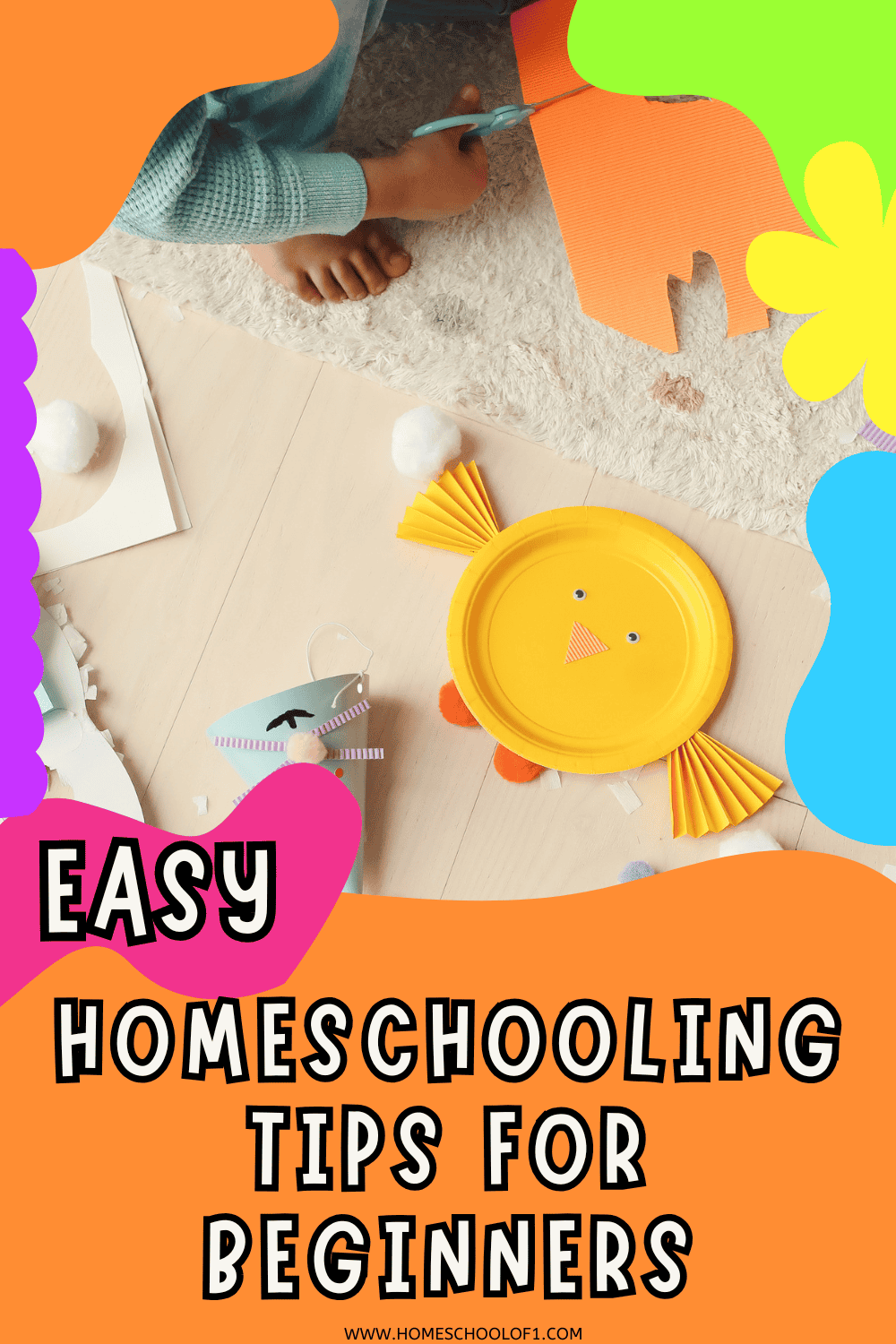Homeschooling Tips That Make Home Education Work for You
Homeschooling tips can be a lifesaver when you’re just starting out or feeling stuck.
I still remember how overwhelmed I felt trying to choose a curriculum and create a schedule that actually worked. Over time, I’ve figured out what helps most, both for staying organized and keeping learning enjoyable.
Whether you’re beginning your homeschool journey or refining your routine, these tips come from real experience and are meant to make the process feel more doable.
From finding your style to staying connected, I hope this gives you a clearer path and a little encouragement too.

**This post may contain affiliate links. As an Amazon Associate and a participant in other affiliate programs, I earn a commission on qualifying purchases.**
Getting Started with Homeschooling
Before jumping into curriculum or schedules, there are a few important steps every new homeschooler should take to lay a strong foundation.
Understand Your State’s Requirements
Before you begin, familiarize yourself with your state’s homeschooling laws. Each state has different requirements regarding compulsory education, standardized testing, and record-keeping.
The Home School Legal Defense Association (HSLDA) is a valuable resource for understanding these regulations and ensuring compliance.
Set Clear Goals and Expectations
Define what you hope to achieve through homeschooling. Are you looking to provide a Christian education, cater to functional needs, or pursue a gifted program?
Setting clear goals helps in selecting the right homeschooling curriculum and keeping your educational journey on track.
Choose a Homeschooling Method
Explore various homeschooling methods to find one that aligns with your child’s learning style and your educational philosophy. Popular homeschool styles include:
- Classical Education: Focuses on the trivium (grammar, logic, and rhetoric) and emphasizes critical thinking and classical languages.
- Charlotte Mason: Emphasizes living books, nature studies, and narrations.
- Montessori: Child-led learning with hands-on homeschool activities and real-world experiences.
- Unschooling: Learner-directed education that follows the child’s interests.
- Eclectic/Relaxed: Combines elements from various methods to create a personalized approach.
Curriculum and Resources
Once you’ve chosen a homeschooling approach, the next step is finding the right materials and tools to support your child’s learning style and your goals.
Select the Right Curriculum
Choosing a homeschooling curriculum can feel overwhelming. Focus on programs that fit your educational goals and your child’s learning style. These are some widely used options:
- Pandia Press: A secular option focused on history and science.
- Abeka: A Christian-based program known for structure and academic rigor.
- Sonlight Curriculum: A literature-rich curriculum with a strong Christian foundation.
- Khan Academy: Free online courses across most core subjects.
- Oak Meadow: A flexible, creative curriculum with Waldorf inspiration.
- Apologia: Christian science curriculum popular among homeschoolers.
- Rosetta Stone: Language learning through immersive software.
Explore the best secular homeschool curriculum for math, science, language arts, and more.
Incorporate Hands-On Learning
Hands-on activities like science experiments, art projects, and field trips make lessons more engaging, especially for kinesthetic learners. These experiences help reinforce key academic concepts in memorable ways.
Utilize Online Resources
Free online homeschool programs can be a great supplement to your core curriculum. Many offer structured lessons, video instruction, and interactive exercises across a wide range of subjects.
Organizing Your Homeschool
A bit of structure goes a long way in keeping your homeschool running smoothly. Here are some simple ways to stay organized and reduce daily stress.
Create a Learning Environment
Designate a specific area in your home for schooling. This space should be organized, free from distractions, and stocked with supplies like textbooks, workbooks, and art materials.

Develop a Schedule
While homeschooling allows for flexibility, having a consistent schedule helps create a rhythm. Try setting a daily or weekly routine with time blocked for each subject, regular breaks, and any extracurriculars.
Keep Records and Portfolios
Tracking your child’s progress is important for both assessment and meeting state requirements. Save lesson plans, completed work, grades, and any test scores.
If you’re tracking credits and GPA in high school, our Homeschool GPA Calculator can simplify the math.
You can also explore our list of best homeschool planners to stay on top of schedules and goals.
Socialization and Extracurricular Activities
Just because you’re homeschooling doesn’t mean your child has to miss out on social interaction or enrichment. There are plenty of ways to stay connected and engaged beyond academics.
Join Homeschool Co-ops and Support Groups
Connecting with other homeschoolers through co-ops and support groups offers both community and accountability.
These groups often plan field trips, organize group classes, and create regular opportunities for kids to make friends and work with peers.
You might also enjoy some of our favorite virtual field trips for homeschoolers, which are great when in-person options are limited.
Participate in Extracurricular Activities
Getting involved in sports, music lessons, theater, or art classes gives your child the chance to explore interests, build confidence, and interact with others in different settings.
These activities can be an important part of a well-rounded homeschool experience.

Addressing Common Challenges
Every homeschool comes with its own hurdles. From socialization worries to managing multiple grade levels, these tips can help you troubleshoot the most common issues.
Overcoming Socialization Concerns
One of the biggest questions people ask about homeschooling is how kids make friends. But in reality, co-ops, community events, and online groups offer plenty of chances for social interaction.
Encourage your child to join clubs, volunteer locally, or take part in group activities.
For more ideas, check out these homeschool tips for an only child.
Balancing Multiple Children
Juggling multiple ages and subjects is a common challenge. Try combining subjects like history or science across grade levels and scheduling one-on-one time where needed. Letting older kids help younger siblings can build independence and lighten your load.
Handling Support Needs
Homeschooling can be especially flexible for children with functional needs. Look for a curriculum that supports your child’s specific learning style, and don’t hesitate to bring in outside help, like speech therapists or reading tutors, when needed.
For more tailored options, you might explore our list of ADHD homeschool curriculum.
Preparing for Higher Education
As your child enters the high school years, your homeschool approach may shift toward transcripts, credits, and long-term goals. Here’s how to stay on track for graduation and beyond.
High School and Beyond
For high schoolers, homeschooling can provide a flexible path to graduation and college preparation. Make sure to cover core subjects, include electives, and keep detailed transcripts.
Prepping for standardized tests like the SAT or ACT is also key. Many homeschoolers transition smoothly into college, often with strong academic and personal portfolios.
Need help choosing? Take a look at our picks for the best homeschool curriculum for high school.
Dual Enrollment and College Credit
Dual enrollment at local community colleges allows homeschool students to earn college credits while still in high school. It’s a great way to introduce more advanced coursework and lighten the future college load.

Encouragement and Support
Even the best homeschool plans can feel overwhelming at times. Staying encouraged and connected makes a big difference in how sustainable and joyful your journey feels.
Seek Encouragement and Inspiration
Homeschooling can be demanding, so it helps to surround yourself with people who understand the highs and lows.
Join online forums, attend homeschool conferences, and read books written by experienced homeschoolers. A strong support system can keep you motivated during challenging seasons.
Not sure where to start? Here are some of the best homeschool blogs you should be following
Practice Self-Care
Taking care of yourself isn’t a luxury, it’s part of being an effective homeschool parent. Make time for hobbies, rest, and social connection. A balanced mindset will help you show up with more patience and creativity day to day.
Homeschooling is a dynamic, evolving journey. Keep learning, keep adjusting, and don’t be afraid to make it your own.
Need a fun way to personalize your homeschool? Try our homeschool name generator for creative ideas.
Last Updated on 21 October 2025 by Clare Brown







Great read!!! I have been homeschooling my children and tips like these are very helpful.
Great read!!! Thanks for sharing the benefits of homeschooling, this will help every homeschooler. I have homeschooled my children and both are doing well in their Accredited middle School ?and this is only because of all the tips that I have used while homeschooling to make homeschooling successful.
I’m homeschooling my anxious 13 year old son….we go by a timetable I’m so terrified that I’m doing it all wrong and ruining his future…he won’t socialise and is lonely but wants to home school. Some days it works others he questions all my topic choices and teaching skills..I’m so worried! !!